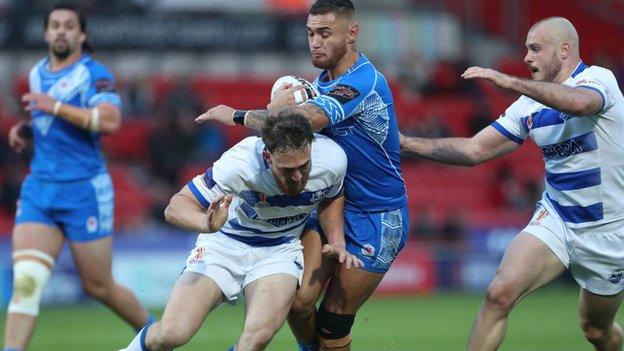Rugby League World Cup: How Greece are showing sport is taking development seriously
- Published
Rugby League World Cup: Greece score first World Cup try against France
When England play Greece on Saturday the final result may well look similar to a scorecard at Cricket's T20 World Cup.
Shaun Wane's side put on an impressive 60 points against a Samoa side almost entirely featuring the pedigree of Australia's National Rugby League (NRL) in the opening game.
So against the Greek part-timers and hobbyists, it could be eye-watering.
But never mind the numbers, rejoice in the fact that Greece are simply at this World Cup.
They are not here just as a sideshow. Their involvement offers hope for the future of the international game.
Greek rugby league is an incredible tale of a band of outlaws who beat the authorities as well as their opponents to qualify.
They have had moments of joy - Nick Mougios' slalom-like run to the line against France in the opening game was heart-warmingly good and one of the more magical tries of the tournament.
And when we went into their camp to record a special podcast this week, you could sense the thrill they're having in their adventure.
Greece aren't the only newbies in this men's tournament. Jamaica are on a similar voyage of discovery and have loved celebrating their small moments of success - like Ben Jones Bishop's try against New Zealand, despite a 68-6 thumping.
Rugby League World Cup: Jamaica score first World Cup try and celebrate in style
In 2017 Lebanon made a splash. Four years earlier Scotland's Braveheart's were causing a brouhaha. And Italy, Wales and Ireland are never too far away from the limelight.
Amongst the established giants, there's always a smattering of minnow nations adding to the festival feel. Countries where rugby league creates barely a passing interest normally, suddenly arrive at the World Cup with a fanfare.
For the most part it's heritage rules that allows those sides to claim their moment in history. There are scores of Australian and English-born players proudly representing the land of their parents and grandparents, rather than their country of birth.
That's great, but as a long-term plan it's unsustainable.
At some point that particular source of player talent will begin to run dry. So to maintain a world game, rugby league needs to spend more time and money in developing the domestic games in these smaller nations.
The value of this World Cup is that, for once, the game says it is taking international development seriously.
The profile provided by a worldwide audience of millions and the finance generated from this tournament will help nurture those local leagues. Part of the profits from this event will, we are promised, be reinvested into the International Rugby League's (IRL) development projects.
It's already happening in Jamaica. Their national champions Duhaney Park Red Sharks have provided five players for the current squad. A sixth, Abevia McDonald, played for Hurricanes in Jamaica and has since signed for London Skolars.
He was a footballer growing up and knew nothing about rugby league. But in an interview he reveals that he switched to rugby league because he had an "instant fascination with the shape of the ball".

Greece have lost to Samoa and France, conceding 106 points so far at the World Cup
In the Greek camp there are more examples of men who just needed an introduction to the game in order to fall in love with it.
Aris Dardamanis, who plays for the Aris Eagles, told us that when a friend invited him to a training session 10 years ago he had no idea what to expect. He was a martial arts, volleyball and American football lover.
What he experienced in that first session was an intoxicating mix of all his sporting passions and he was hooked. Now he's representing his country at rugby league.
It's another example of the more people that can be exposed to rugby league, the more men and women you will get playing the game.
Show them and they will come.
Despite being banned in Greece up till a couple of months ago, there are now 10 men's sides and three women's sides in and around Athens.
The funding and profile they will get from World Cup 2021 will go a long way to getting the sport into schools, better marketing and a boost in club and player numbers.
Closer to home, the IRL and the Rugby Football League also have a duty to ensure that the right encouragement and funding is given to development in Scotland, Wales and Ireland.
The Galway Tribesmen caused a ripple when they played in the Challenge Cup's early rounds this year, but, Ronan Michael aside, there aren't many Irish-born players playing at the top level.
Welsh interest in the game still has a pulse, and they do have several homegrown players in their squad. But that's nothing compared to the interest in Wales around the 1995 World Cup when Jonathan Davies and co were making headlines.
And Scotland goes from World Cup to World Cup without making too many giant strides in the production of indigenous talent.
That's not a criticism of the handful of dedicated and passionate people that work hard to promote the sport in those countries. It's the lack of support they've often had that is the crying shame.
Rugby league's greatest players come, in the main, from a small bunch of towns and cities in the north west of England and a couple of states in Australia.
That restricted area is still able to produce some amazing athletes with incredible powers to entertain and amaze, as we've witnessed already in the last couple of weeks.
Imagine if that gene pool could be extended to even just two or three more countries.
Everyone in rugby league has a role to play in encouraging the spread of the game. That especially includes the clubs in England and Australia who barely gaze over their own backyard walls.
The hope is that when the 2025 World Cup kicks off in France, there will be players born in Greece, Jamaica, Italy, Scotland, Ireland et al, who were tempted to pick up a rugby ball, inspired by the trailblazers at this event.
And by then we need to be talking about burgeoning domestic leagues in some of those minnow nations, not just the promise of what could be. Otherwise the best intentions of RLWC2021 will have been wasted.

When is a criminal no longer a threat? Bad People considers when offenders should be released
How to fool the opposition in sport effectively: Sideways dives into the world of deception

